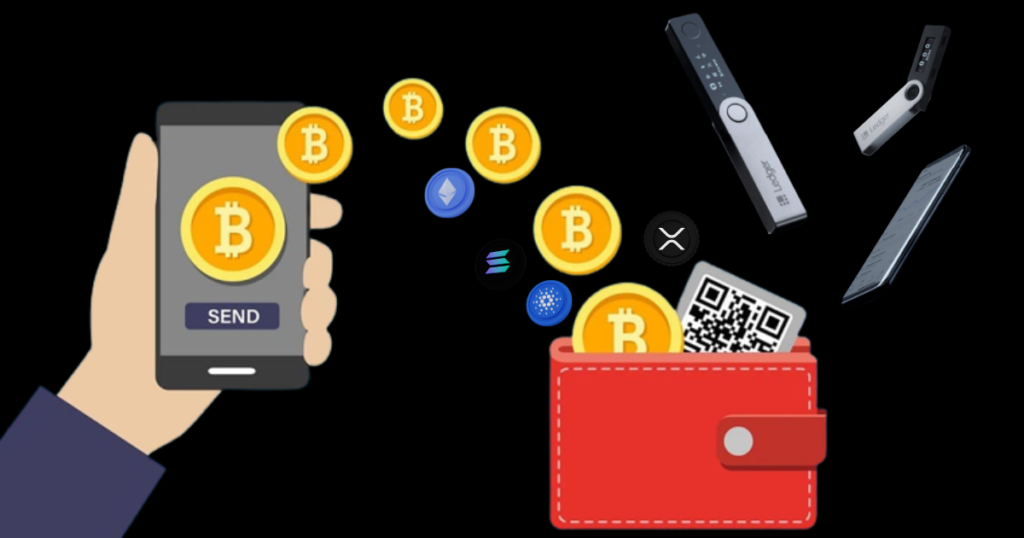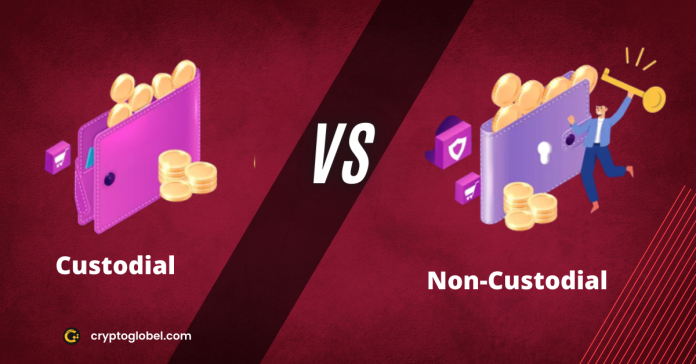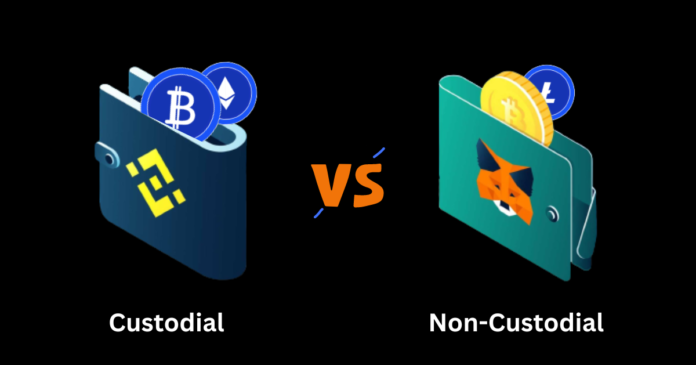Have you ever wondered how and where your cryptocurrency is kept? Token holders can store their cryptocurrency in a variety of crypto wallets. However, these can be divided into custodial and non-custodial wallets. If you’ve ever used bitcoin or other cryptocurrencies you know how important it is to have a digital wallet. You’ll need one if you want to make transactions, trade on a cryptocurrency exchange, or use blockchain applications. As a result, it’s critical to understand how bitcoin wallets operate and the primary distinction between custodial and non-custodial wallet providers.
In this article, we’re going to learn about both custodial and non-custodial wallets, how they are different when to use one or the other, their advantages and disadvantages, and what my thoughts are on them.
How do Cryptocurrency Wallets work?
A cryptocurrency wallet is a software application that allows you to communicate with a blockchain network, you can use it to transfer and receive cryptocurrency and access decentralized applications or DApps. Technically crypto wallets do not hold your digital assets instead they generate the data required to employ cryptography. Nonetheless, many crypto users employ the term to make things easier to understand for newcomers so we’ll continue to use it throughout this article.
A crypto wallet comprises two primary components, a public key, and a private key. People can send you cryptocurrency by sending it to one of your addresses which is produced by your wallet’s public key. Your wallet addresses and public keys can be distributed to others hence the term public. However, because it signs transactions and enables access to your funds your private key should be considered a confidential password. You can access your crypto from any device if you keep your private keys safe. While cryptocurrencies are digital crypto wallets that carry private and public keys that can be printed on paper, accessible through desktop wallet software, or saved offline on hardware wallet devices.
Some wallets also allow you to store and transfer non-fungible tokens or NFTs issued on a blockchain. However, you will always have custodial and non-custodial crypto wallets regardless of the wallet type.

What is a Custodial Cryptocurrency Wallet?
A custodial crypto wallet as the name implies is one in which your assets are held in custody for you. Your private keys will be saved and managed by a third party on your behalf. Consequently, you won’t have complete control over your money and won’t be able to sign any transactions. However, employing a custodial crypto wallet service isn’t always a terrible thing. In the early days of bitcoin all users had to build and manage their wallets and private keys, while becoming your own bank has many advantages it can be inconvenient and dangerous for inexperienced users.
You will lose permanent access to your crypto assets if your private keys are stolen or lost. According to blockchain analysis findings over 3 million bitcoin may be gone forever for this very reason. There have also been cases where crypto inheritance was unrecoverable since the original crypto owner was the only one to keep the private keys. You can avoid such events by sharing access to your assets with a custodian. Even if you lose your cryptocurrency exchange password you should be able to access your account and assets by contacting customer service.
If you use a non-custodial wallet you are responsible for keeping your cryptocurrency safe. As a result in many circumstances, it makes sense to use a custodial wallet service. This however implies that you are committing your private keys to a third party which is why selecting a reputable exchange or service provider is critical.
When researching custody service providers look for details such as if they are regulated, what types of services are provided how your private keys are handled and whether there is insurance coverage. Binance custody for example which is both licensed and compliant provides basic insurance for corporate Binance accounts. It also provides criminal insurance coverage and other bespoke insurance requirements on request. Binance custody also employs multi-signature wallets or multi-sig which eliminates centralized risks by requiring many parties to approve crypto transactions before execution.
What is a Non-custodial Cryptocurrency Wallet?
A non-custodial crypto wallet is one in which only the holder can access and control the private keys. Non-custodial wallets are the ideal alternative for individuals who desire complete control over their cash because there are no middlemen you can exchange cryptocurrency directly from your wallets. It’s an excellent choice for seasoned traders and investors who understand how to preserve and safeguard their private keys and seed boards. When communicating with a decentralized exchange or decentralized application you’ll need a non-custodial wallet.
Popular decentralized exchanges that need a non-custodial wallet include uni-swap, sushi swap, pancake swap, and quick swap. Non-custodial wallet service providers include trust wallet and Metamask. However, remember that you are solely responsible for securing your seed phrase and private keys when using these wallets.
Advantages and Disadvantages of Custodial Wallets
As previously stated the main disadvantage of custodial wallets is that you must entrust your assets and private keys to a third party. Most service providers will also demand identity verification or KYC. On the other hand, the benefit is peace of mind and convenience. You won’t have to worry about losing your private key, if you have any problems you can contact their customer support. Select a reputable organization that provides good security and insurance coverage when using custodial services. Keep an eye out for regulated and compliant custodians. Some cryptocurrency custodians have additional standards that you may not meet. Binance custody for example is a custodial service provider that currently only accepts corporate clients, for further information see the Binance custody faq.
Advantages and Disadvantages of Non-Custodial Wallets
Non-custodial wallets control your keys and funds without a third-party guardian in other words you own your assets and can be your own bank. Furthermore, non-custodial transactions are typically speedier because there’s no need to wait for withdrawal clearance. Finally, if you don’t use a custodian you avoid paying extra custodial fees, which might be expensive depending on your service provider. As previously stated one disadvantage of adopting non-custodial wallets is their accessibility and simplicity of use. They are typically less user-friendly and might be difficult for first-time cryptocurrency holders. This should be handled in the future as non-custodial service providers evolve.
Of course, you are still solely responsible for your keys and must take measures when handling them. This means that instead of relying on someone else to manage your finances you must rely on yourself. I recommend the following security precautions to secure your crypto and protect yourself from hackers use a secure password. For an added degree of security enable two-factor authentication to maintain vigilance against scams and phishing attacks and finally use caution when clicking links and downloading new applications.

Which wallet Type should you Use for your Cryptocurrency?
Both wallet types are suitable for storing crypto assets including NFTs. In fact, most traders and investors employ both types in various scenarios however you must ensure that the selected wallet supports the type of cryptocurrency you intend to store in it. They cannot all be saved in the same manner.
Several blockchain networks run various sorts of cryptocurrencies we can categorize these types based on token standards but remember that the same tokens may run on multiple blockchains under different criteria. BNB for example is available as a bep20 token on the BnB smart chain and a bep2 token on the BnB beacon chain.
Some of the most frequent token standards are as follows 20, Bep-721, Bep-1155, and BnB smart chain are all Beps. Bep2 for BnB beacon chain for Ethereum there’s erc20 Erc-721 and Erc-1155 and Spl for Solana.
Non-custodial wallets such as Metamask trust wallet and math wallet accept the most prevalent and popular crypto assets. If you’re confused about which tokens your wallet supports consult their official faq or documentation. Wallets that are constantly improving to fulfill the needs of their users may eventually support more tokens. Binance custody for example presently supports bitcoin, Ethereum, bitcoin cash, Litecoin, BUSD, BnB, cake, and a variety of other erc20 tokens. To meet user needs Binance custody will gradually add more token types over time.
Related: Pros and Cons of DeFi Wallets
Conclusion
What are my thoughts? Is it better to have custodial wallets or non-custodial wallets? Most cryptocurrency users actually utilize both but it all depends on your needs. If you prefer complete control over your assets or merely wish to leverage blockchain technology to communicate with Defi applications a non-custodial wallet should be considered. However, if you want a service provider to handle your storage needs while you trade or invest then you should look for reputable custodial wallet service providers. I hope you got value from this video and have a better understanding of custodial and non-custodial wallets. so I’m curious what are your thoughts do you have a preferred wallet type or do you perhaps use both leave a comment below about which type of wall you use and why?

